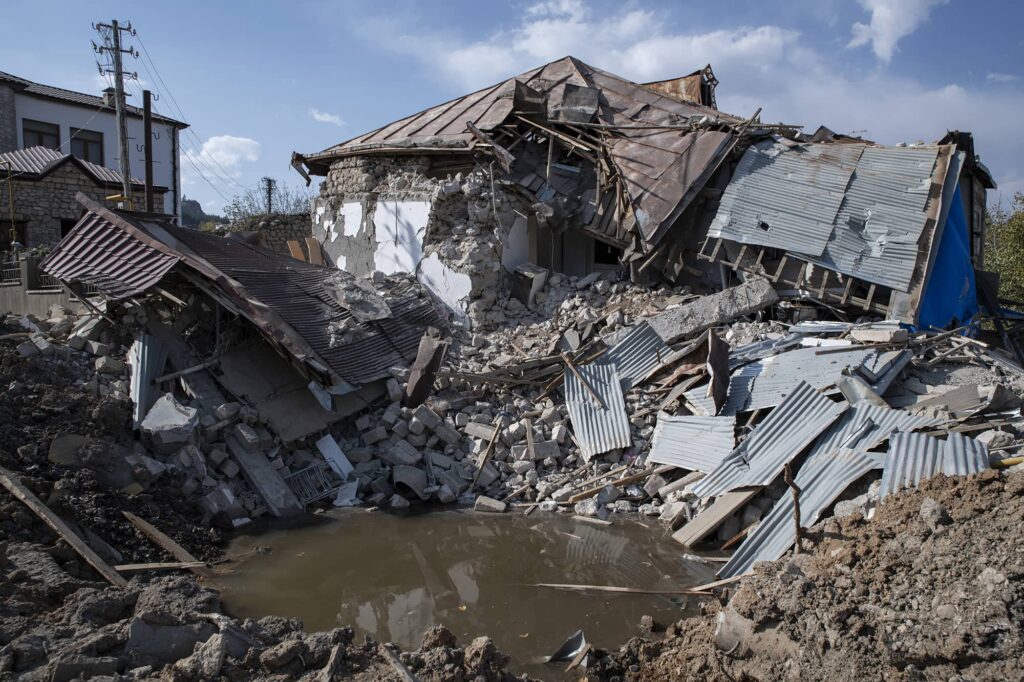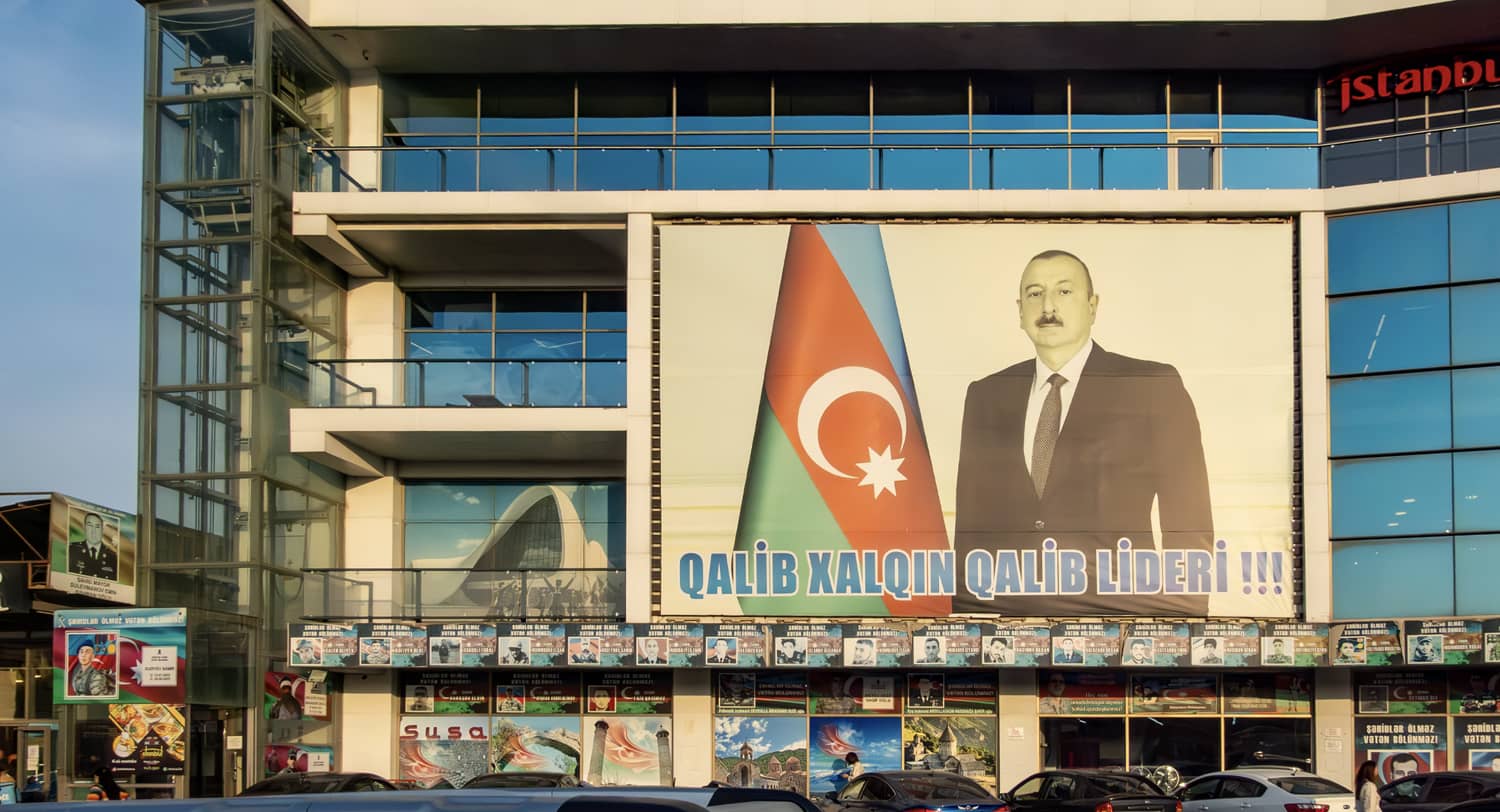Over the course of 33 years since the fall of the Soviet Union, Azerbaijan has transformed into an independent regional player. Its neighbors in Armenia fear that Azerbaijan’s ambitions will eventually lead to another war. Average Azerbaijanis, meanwhile, wonder when the military achievements will translate into economic prosperity.
Regaining Territory Through War
It’s impossible to miss the portraits of fallen Azeri soldiers when strolling through the wide avenues of Baku or the narrow streets of provincial towns and villages. The dead soldiers, whose images look down from the walls of buildings, all perished during the 44-day war with Armenia in September 2020.
The 30-year conflict between Azerbaijan and Armenia centers on the disputed Nagorno-Karabakh region. In Soviet times, this was a mountainous region of the Azerbaijani republic with a majority Armenian ethnic population. The war that broke out in 2020 ended in Azerbaijani victory, owing to its use of modern military technologies, particularly drones, with Turkey’s military support. Three years later In September 2023, Azerbaijan launched a brief military operation in Nagorno-Karabakh, swiftly taking control of the region. Armenia had taken it following a war in 1991-1992. Today, most of the area’s ethnic Armenian population, about 100,000, have evacuated to Armenia just as 30 years ago, the area’s Azeri ethnic population fled to Azerbaijan.
Military success alone js insufficient to resolve all the challenges facing this post-Soviet nation. Azerbaijan still grapples with establishing its position on the global stage, highlighting the complexity of translating military triumph into long-term geopolitical and economic success.
Thirty-three years after the USSR collapsed, this ex-Soviet republic is still grappling with complex internal and external challenges.
Yawning Socio-Economic Gaps and Authoritarian Rule
The statues of Heydar Aliyev, ruler of post-Soviet Azerbaijan from 1993-2003, and portraits of his son, Ilham Aliyev, are an inseparable part of the cityscape in Azerbaijan. The country has a strong presidential system and a submissive legislature. The democracy watchdog group Freedom House, in its 2023 Freedom Report, ranked Azerbaijan’s political system as “not free”, and the persecution of critics is becoming more severe. Unlike Georgia, Armenia, Ukraine and Moldova, Azerbaijan has not experienced any form of “Maidan” or popular pro-democracy movement. The ruling Aliyev family’s grip on power remains strong. The victory over Armenia in 2020 certainly boosted the president’s popularity to unprecedented levels.
The Aliyev regime likes to host major international events. A huge construction site is visible just in front of the main train station in Baku where, in mid-November, the city hosts UN COP-29. Tens of thousands come each year for Formula 1’s Baku Grand Prix. Baku’s Olympic Stadium has hosted the Eurovision contest, the 2015 European Games, and the 2019 Europa League football final. Azerbaijan also enjoys a thriving tourism industry attracting mainly Russians, iranians, Gulf Arabss and Israelis. There are several fully packed daily flights between Tel Aviv and Baku.
For the older generation that grew up in the Soviet Union, all this is still something of a wonder. Just 30 years ago, there was little tourism infrastructure, as foreign tourists were blocked off by Soviet borders, and the state never cared to invest in domestic tourism. Memories of standard Soviet hotels with dysfunctional facilities and unpleasant odors still give shivers to those unfortunate enough to have visited them.
Azerbaijan has certainly taken a big leap since then. Modern roads are now being built between Baku and remote cities, such as Gabala, while A-shaped chalets available for rent on internet sites are scattered across the picturesque mountains. The older generation can manage with Russian, but it seems that for younger Azerbaijanis, this is no longer a prioritized language. In fact, in the bazaars of ancient Sheki, once home to powerful khans who dominated the region, you see more signs in Arabic, catering to Gulf tourists, than in Russian.
Like other countries in this area, there is a stark difference between the capital city and the periphery. The average annual income per person in the country is $4,000, while in Baku it is more than $10,000. In 2022, almost twice as many businesses were registered in Baku and its surroundings than in the rest of the country, and their number grew in the capital significantly faster than in the regions.
Thirty-seven percent of the working-age population is employed in agriculture, yet they generate only 5 percent of the country’s gross domestic product. The average salary in the country is $430, while those employed in agriculture earn significantly less. The difference between the poor villages and the oil-rich elites in the center is striking. Many young and educated Azerbaijanis are leaving the country due to inequality and corruption. In 2023 Corruption Perceptions Index results, Azerbaijan’s score of 23 indicated that it is perceived to be more corrupt than its neighbors, Georgia (53), Armenia (47), Russia (26), and Iran (24).
Just recently, Azerbaijan held parliamentary elections. Results showed the ruling New Azerbaijan Party securing a narrow majority of 68 of the 125 seats in the National Assembly. Forty-four seats were won by independents, while the remaining seats were won by smaller parties. The opposition party, liberal centrist Musavat party, refused to recognize the legitimacy of the new parliament, describing the election as “accompanied by widespread violations, including multiple voting by the same individuals and groups, ballot stuffing, and pressure on observers.”

Friend of Israel, Neighbor of Iran, Enemy of Armenia, Ally of Turkey
Like the fading portraits of the fallen soldiers, the sense of excitement about the military victory is also changing. Azerbaijanis had expected that this move to be a game-changer, bringing the long-promised prosperity and peace. They still await the restoration of the Karabakh area and the return of its Azerbaijani residents. Many areas in Karabakh remain in ruins almost four years after the war. Authorities estimate that the restoration will cost over $100 billion, money that will have to come from foreign loans and investment. But the West seems reluctant to finance the restoration of Karabakh due to the expulsion of over 100,000 Armenian refugees in the brief war of September 2023.
At that time, France took the lead on demands to sanction Baku while Azerbaijan began criticizing Paris for its “neo-colonial” policies, particularly regarding continued French sovereignty over overseas territories, primarily New Caledonia. While ties with the EU and partly with the US were overshadowed by the outcome of the 2020 war, Ilham Aliyev seems to skillfully navigate his relations with Turkey, Russia, Iran, Israel, and the Gulf states.
Turkey emerged as Baku’s main supporter during the war, though Azerbaijan also heavily relied on Israeli weapons both during the war in 2020 and during the takeover of Karabakh in 2023. It managed to maintain an independent policy toward Israel, even as Israel’s relations with Ankara significantly deteriorated during the war in Gaza.
While the ice between Baku and Tehran remains thick, there is an undeniable rapprochement that includes the reopening of diplomatic missions in both countries. Relations had been suspended following a violent attack on Azerbaijan’s embassy in Tehran in 2023.
President Ilham Aliyev, after 20 years in power, seems focused on improving the local economy. With turbulence in relations with the EU and the US over issues of human rights and the situation in Karabakh, Baku aims to develop its relations with others – from the UAE and Israel to Russia and Iran (Russian President Putin paid a visit to Azerbaijan this August).
One thing is clear: 62-year-old Ilham Aliyev will continue to determine his country’s future. His portraits in government buildings, banks, and shops are not about to fade.

